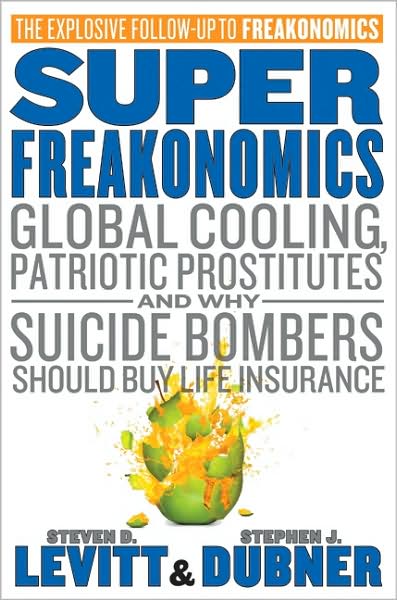
As an economics major, whenever a book about economics makes it onto the New York Times bestselling list, I am morally obligated to read it. Such was the case with Levitt and Dubner's first work,
Freakonomics.
I loved that book because I could identify with Steven Levitt. I, too, am mostly only interested in microeconomics and couldn't care less about global interest rates or the monetary system. Whenever I tell people that I'm an econ major, they respond with, "So what do you think about the recession?" or "How's about that hike in interest rates?" I typically respond with some comment that I remember from the bare minimum of macroeconomics classes that I was forced to take, like "Well, that'll have ramifications on the savings/spending ratio." while actually thinking inside, "Don't know and don't care!"
My interest in economics lies mostly with Game Theory, Industrial Organization, and Economics of Regulation. My focus is on individual firms and why they make the decisions that they do. I'm intrigued by the idea of natural monopolies in the electrical transmission industry and how we can change their incentives so that they want to give fair prices to consumers. I get a rush out of finding Nash equilibria and calculating ideal price discrimination schemes. So few people understand that there is more to economics than Adam Smith, John Maynard Keynes, and Milton Friedman. There's an entire world out there about how people act and why.
So I found a kindred spirit in Steven Levitt when he wrote a book about sumo wrestlers who have disincentives to win one match relative to another, about strategic naming of children, and why people are more scared of guns than pools. The original Freakonomics was full of little economic gems that made me wish I actually understood econometrics so that I could analyze similar exciting data.
It was with great anticipation that I purchased my copy of Superfreakonomics. I was hopeful for another engrossing read full of nuggets of humour, well-applied econometric skills, and insightful conclusions, all organized into a cohesive book that would fill my need for fun economic applications.
My hopes, while not dashed to pieces, were let down.
Superfreakonomics is a clever book, and it has it's moments of sheer brilliance. The introduction about walking drunk showed skillful use of statistics, dashes of humour, and well-phrased conclusions, while the conclusion about the applications of consumer theory to a monkey experiment made me laugh out loud and identify concepts from all my micro classes. A chapter near the beginning analyzes the effects of the sexual revolution on the real wages of prostitutes (which, had they been any other industry group, would have had great success in lobbying the government for a compensating bailout) was extremely well done.
However, many of the chapters were glued together pieces of hodgepodge, unsupported by conclusive data or sound econometrics. The chapter on global warming seemed to me to have little relevance to economics and jumped from issue to issue like a kangaroo on a pogo stick.
In conclusion, it's worth a read, but definitely a selective one. And probably using a copy from the library. My copy is also available for loan. If you want a really entertaining book that will teach you something about economics, borrow my copy of Games, Strategies, and Decision-making by Joseph Harrington instead.


